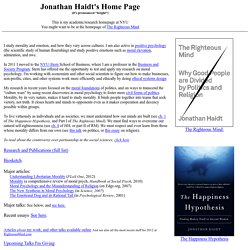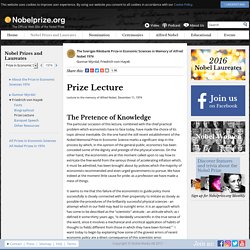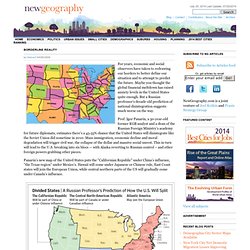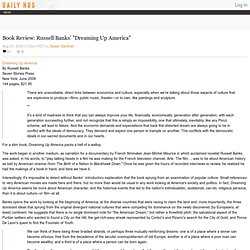

Experiences that help you explore death and celebrate life. Homepage. Jon Haidt's Home Page. I study morality and emotion, and how they vary across cultures.

I am also active in positive psychology (the scientific study of human flourishing) and study positive emotions such as moral elevation, admiration, and awe. In 2011 I moved to the NYU-Stern School of Business, where I am a professor in the Business and Society Program. Stern has offered me the opportunity to test and apply my research on moral psychology. I'm working with economists and other social scientists to figure out how to make businesses, non-profits, cities, and other systems work more efficiently and ethically by doing ethical systems design My research in recent years focused on the moral foundations of politics, and on ways to transcend the “culture wars” by using recent discoveries in moral psychology to foster more civil forms of politics.
To live virtuously as individuals and as societies, we must understand how our minds are built (see ch. 1 of The Happiness Hypothesis, and Part I of The Righteous Mind). Friedrich August von Hayek - Prize Lecture: The Pretence of Knowledge. Lecture to the memory of Alfred Nobel, December 11, 1974 The Pretence of Knowledge The particular occasion of this lecture, combined with the chief practical problem which economists have to face today, have made the choice of its topic almost inevitable.

On the one hand the still recent establishment of the Nobel Memorial Prize in Economic Science marks a significant step in the process by which, in the opinion of the general public, economics has been conceded some of the dignity and prestige of the physical sciences. On the other hand, the economists are at this moment called upon to say how to extricate the free world from the serious threat of accelerating inflation which, it must be admitted, has been brought about by policies which the majority of economists recommended and even urged governments to pursue. We have indeed at the moment little cause for pride: as a profession we have made a mess of things. This brings me to the crucial issue. 1. 2. 3. 4. 5. 6. 7.
Recommended: Interaction of natural survival instincts and internalized social norms exploring the Titanic and Lusitania disasters. Pinker. From Lycos to Ask Jeeves to Facebook: Tracking the 20 most popular web sites every year since 1996. Our goal is not to confuse or alarm you, but we must, as agents of the news media, speak the truth.
And so we say, with all due solemnity, that if it were 16 years ago, you would right now be reading this article at Excite.com. That’s really one of the best case scenarios. You could also be at Infoseek, or Tripod (what) or Xoom (what?). Because the web in December 1998 was a much different, much lamer place. We like to think of sites like Google, Facebook and Amazon as immutable — parts of the web as it exists now and has always existed. Sites like AOL and Yahoo did exist — and were popular. We will be the first to admit that this is too small to read (though you can click on it, which improves things).
Borderline Reality. For years, economic and social observers have taken to redrawing our borders to better define our situation and to attempt to predict the future.

Maybe you thought the global financial meltdown has raised anxiety levels in the United States quite enough. But a Russian professor’s decade old prediction of national disintegration suggests much worse on the way. Prof. Igor Panarin, a 50-year-old former KGB analyst and a dean of the Russian Foreign Ministry’s academy for future diplomats, estimates there’s a 45-55% chance that the United States will disintegrate like the Soviet Union did sometime in 2010. Book Review: Russell Banks' "Dreaming Up America" Dreaming Up AmericaBy Russell Banks Seven Stories Press New York: June 2008 144 pages, $21.95 There are unavoidable, direct links between economics and culture, especially when we're talking about those aspects of culture that are expensive to produce—films, public music, theater—or to own, like paintings and sculpture. ** It's a kind of madness to think that you can always improve your life, financially, economically, generation after generation, with each generation succeeding further, and not recognize that this is simply an impossibility, one that ultimately, inevitably, like any Ponzi scheme, will lead to failure.

And the economic demands and expectations that back this distorted dream are always going to be in conflict with the ideals of democracy. They demand and expect one person to trample on another. This conflicts with the democratic ideals in our sacred documents and in our hearts. For a slim book, Dreaming Up America packs a hell of a wallop.